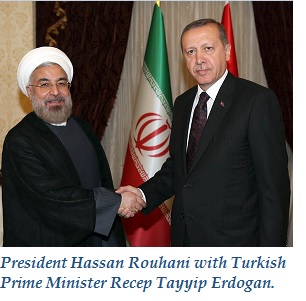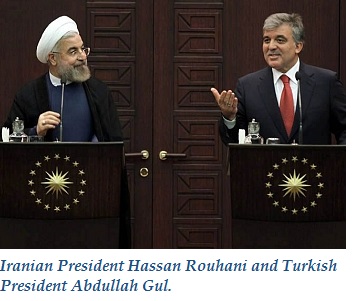Henri Barkey
Why did President Rouhani visit Turkey?
On June 9-10, Iranian President Hassan Rouhani made his first visit to Turkey since his election a year ago. It was the first by an Iranian leader to Turkey in 18 years. By contrast, many senior Turks, including Prime Minister Recep Tayyip Erdogan and President Abdullah Gul, had visited Iran multiple times.
 Accompanied by a gaggle of businessmen, the trip had all the earmarks of a commercial mission. Turks and Iranians often say that they want to substantially increase the volume of trade. Turkey buys large quantities of oil and gas from Iran, but its export markets for other goods have been constrained, often by political considerations. President Rouhani seemed to want to encourage Turkish businessmen to engage with Iran.
Accompanied by a gaggle of businessmen, the trip had all the earmarks of a commercial mission. Turks and Iranians often say that they want to substantially increase the volume of trade. Turkey buys large quantities of oil and gas from Iran, but its export markets for other goods have been constrained, often by political considerations. President Rouhani seemed to want to encourage Turkish businessmen to engage with Iran. Turks also wanted to renegotiate the price of gas imports from Iran. Turks have long complained that the cost of Iranian gas is far too high given market conditions. Despite long periods of negotiations between the respective energy ministers, however, no deal was reached.
How did events in Iraq impact their discussions?
The sweep of Mosul by jihadists from the Islamic State of Iraq and Syria happened on the second day of Rouhani’s visit. The magnitude of the loss must have shocked both countries. Jihadist victories do not help either country. Turkey may suffer from a blowback effect, while Iran’s main allies are at risk from an ever-expanding jihadist force now equipped with some of the best armaments in the world.
US equipment now in the hands of ISIS & the Naqashbandi forces in Mosul, Iraq. pic.twitter.com/JO1e5htZFL
— Vijay Prashad (@vijayprashad) June 11, 2014 The fact that Syria and Iraq have now become one theater of war may force both countries to look for alternatives. Both countries tough their assets in Iraq: Iran particularly with the Shiite-led government in Baghdad, and Turkey in Iraqi Kurdistan. But their ability to dictate events on the ground is limited.
How important was Syria to talks between the Iranian and Turkish leadership? The two countries have differed deeply, with Turkey demanding President Bashar Assad’s ouster and Iran providing Damascus with pivotal diplomatic and military assistance.
Syria was the elephant in the room during Rouhani’s visit. Its conflict is perceived to have existential importance for both countries. Along with Russia, Iran been one of two key lifelines for Assad’s minority regime. Assad would not have remained in power without Iran and Hezbollah, the Iranian-backed Lebanese militia that played a vital role in critical battles with the Syrian insurgents. The Iranians are probably more confident about the regime in Damascus than they have ever been. Hezbollah’s help has been quite decisive at times, and Assad has just “won” reelection.
Turkey, on the other hand, has backed the fractured Syrian opposition. Erdogan’s most important foreign policy objective has been the fall of the Assad regime, and Assad’s resilience has turned into an embarrassment for the Turkish prime minister.
 Yet the Turks and the Iranians have managed to agree to disagree on Syria; they have not allowed the Syrian conflict and their differences to mar their relations, which is quite surprising given the stakes. But Iran needs Turkey for its gas exports, and for Turkey Iran is the only alternative to Russian gas. Turkey’s economy has an insatiable appetite for energy, which has convinced the Erdogan administration to make deals it would have never contemplated before.
Yet the Turks and the Iranians have managed to agree to disagree on Syria; they have not allowed the Syrian conflict and their differences to mar their relations, which is quite surprising given the stakes. But Iran needs Turkey for its gas exports, and for Turkey Iran is the only alternative to Russian gas. Turkey’s economy has an insatiable appetite for energy, which has convinced the Erdogan administration to make deals it would have never contemplated before. The Turks have been quite supportive of the Iranian nuclear cause. All in all, despite the Syria difference, the Iranians must feel better about their relations with the Erdogan government than one that would have been dominated by Turkey’s traditional secular elites.
Henri J. Barkey is chairman of Lehigh University’s international relations department and a visiting fellow at the Carnegie Endowment for International Peace in Washington.
Click here for Barkey's chapter on Iran-Turkey relations.
Photo credits: President.ir
